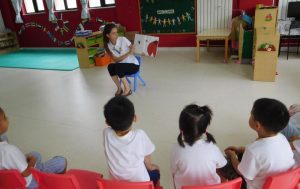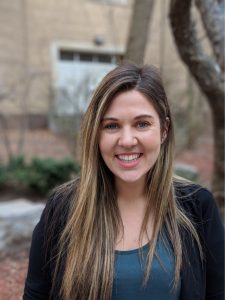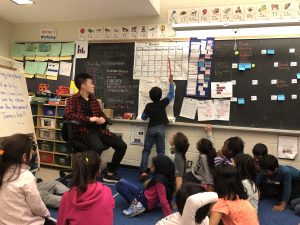After six years of early childhood studies (ECS) and education practice, the first cohort of students from York-Ryerson’s concurrent BA/BEd program have graduated, receiving a bachelor of education from York U’s Faculty of Education and a bachelor of arts in ECS from Ryerson’s School of Early Childhood Studies.

Anna-Maria Shular
“Students in the ECS program develop deep expertise in early childhood, through both their coursework and placements in early-childhood settings,” said Chloë Brushwood Rose, associate dean Academic Programs with York U’s Faculty of Education. “They come to our bachelor of education program with a comprehensive foundation in child development upon which to build their pedagogical knowledge and practice.”
One program aspect graduates said initially appealed to them was the opportunity to be considered in York’s Faculty of Education early on as undergraduate, and have the BEd course offering taught at Ryerson.
“I know a lot of colleagues who – if they only did the undergrad program and waited for further schooling – stressed about it in their third and fourth year,” said 2018 graduate Anna-Maria Shular. “For us, I feel like we got [applications] over with initially and didn’t have to worry about it in the future.”
“Even if I didn’t get in, there was also this comfort of knowing I could try again at the end of my fourth year,” added fellow 2018 graduate Stephanie Galea.
Students completed approximately 40 courses with Ryerson, 10 with York U and participated in six teaching placements. Ryerson’s first-year practicum trained students to teach in daycare settings; in a community resources centre for newcomers in second year; with children with disabilities in third; and students could pursue their preferred teaching setting in fourth.
York U’s respective two placements facilitated students’ transition into full-time teaching.
“Some people in fourth year even went abroad to teach English in places across the world,” said 2018 graduate Jimmy Yu. “People get very impressive resumes. They end up working for SickKids.”
Yu notes learning about classroom management, working with different populations, age groups and tailoring lesson plans for the 2018 classroom were, for him, some of the most significant lessons.
“This generation has technology all over them,” he said. “The old-school projector and chalkboard are not going to cut it for them. These kids are interactive; they want to look at videos on YouTube. They want to use smartboards.”

Stephanie Galea
In Galea’s experience, learning about education and practicing education first-hand were notably different. Every class panned out differently “depending on the kids in it and a host of factors you don’t experience in the classroom like: age group, behavior, and different types of schools and school boards,” she said.
“I really liked that I had the opportunity to complete a placement in a Grade 1 classroom in public school with York U, and my second one at a Catholic school,” Galea said. “I was exposed to working in two different school boards, and also with Grade 4 students.”
Shular noticed her personal program goals eventually became most focused around creating the most reliable lesson plans.
“Usually, when you’re creating lesson plans, you have so many ideas for them to become a reality,” she said. “I wanted to make sure I knew how to accommodate all students, make classrooms more inclusive, time the lessons well and have a good success criterion.”
Yu mentions Ryerson’s program electives and exams, for him, offered a sound technical foundation of childcare. But, “what I like about York’s Teacher Education program is there’s no testing,” he said. “You write memoirs and lessons. It’s based on how well you structure a lesson, versus how well you memorize something.
“The York courses, in particular, are more character development and about becoming a teacher.”
Shular said she too appreciated this aspect of the program, as it showed her what she could improve on.
“For me, sometimes it’s hard to raise my voice. I don’t like being serious with students. I’m more of a flexible person,” she said. “But [the program] showed me how to be serious and flexible at the same time. I feel like York allowed us to build upon our pedagogy.”
In their York placements from January to April, students taught alongside their mentor teachers twice a week, then followed the 20-day May block, where students taught full-time for four consecutive weeks.

Jimmy Yu
Yu believes it was leveraging this May block that proved most advantageous for his development.
“A word of advice I’d give students is: it’s better to plan more than to plan less,” he said. “I spent four or five days on my plan; however, we only got through about 75 per cent of it because of assemblies and events here and there. Really take advantage of that week between your exams and that May block.
“That month of your teaching is basically reflective of how you’re going to be down the road.”
Galea said at the end of her two degrees she feels comfortable walking into a classroom and being the lead teacher. Shular said she feels the program shows what works for elementary students and teachers, and what doesn’t.
“It shows how the system is not just for the teacher; it’s also for the student, the community and the child’s family as well,” said Shular. “It shows us how there are multiple roles in the Ontario education system.”
Brushwood Rose said the new graduates will provide an important bridge for children in primary education, between the worlds of early childhood and schooling.
“Their unique perspective and experience positions them to be leaders in the school system, which has recently introduced not only full-day kindergarten, but a new kindergarten program that emphasizes an innovative pedagogy centred on the child, informed by evidence on learning from early childhood research,” said Brushwood Rose.
Edited from the original story published on the Faculty of Education website.
